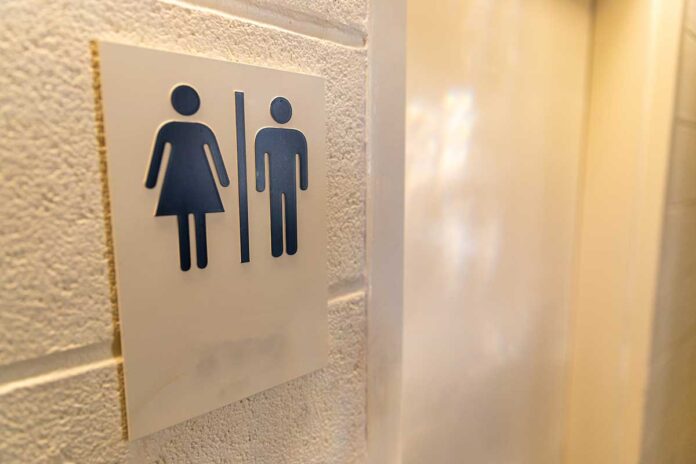LGBTQ+ advocates are closely watching the outcome of a Trans-inclusive restroom dispute unfolding in St. Johns County, Florida. The St. Johns County School District, based in St. Augustine, won’t allow Trans students to use restrooms corresponding to their gender identity.
The legal dispute has ensued since June 2017, when Trans student Drew Adams filed suit against the district. About 47,000 students are enrolled in the district. Although Adams has since graduated, he continues to pursue the litigation. Adams currently attends the University of Central Florida, majoring in psychology.
On Feb. 22, the 11-member Court of Appeals for the 11th Circuit heard oral arguments on the dispute. The 60-minute session centered around privacy and safety concerns expressed by several judges. The court is dominated by Republican appointees and some legal observers are concerned they’ll uphold the school district’s anti-Trans policy.
Adams is represented by numerous attorneys, including attorneys affiliated with Lambda Legal.
During oral arguments, one judge brought up a rape that occurred last year in a high school restroom in Loudoun County, Virginia. Conservative news outlets described the rape as Trans-related, although no evidence has been released that the rapist identifies as Trans.
Other judges expressed concern that gym classes would have to be integrated by gender and that Trans students might act as voyeurs. However, attorneys for Adams argued that such scenarios needn’t be linked to Adams’ case.
Some judges appeared sympathetic to Adams’ position during their questioning. For example, one judge noted the inconsistency of the school-district’s policy. The policy allows Trans students who’ve transitioned prior to enrollment to use restrooms aligned with their gender identity, if a complaint hasn’t been made. However, Trans students who transition after they’ve enrolled in the district are denied such restrooms.
The Biden administration has taken a position in support of Adams’ position. U.S. Department of Justice attorney Elizabeth P. Hecker spoke on behalf of Trans-inclusive restrooms during oral arguments. She declined to comment for this story.
If the court rules against Adams, Trans-inclusive restrooms for students could become inaccessible in Alabama, Georgia and Florida. Appeals courts in San Francisco, Chicago, Cincinnati, Philadelphia and Richmond have ruled in favor of Trans-inclusive restrooms.
If a split develops among the circuits, it’s possible the issue will head to the U.S. Supreme Court for adjudication.
Gabriel Arkles, senior counsel with the Transgender Legal Defense & Education Fund, said he’ll be watching the Adams case closely.
“Transgender students have a right to education, and not being able to use the restroom safely takes that away,” Arkles said, in an email. “Our friends from Lambda and the Department of Justice did an excellent job [during oral arguments]. And the law and facts are on Drew’s side. TLDEF regularly represents transgender and nonbinary people within the 11th Circuit on issues ranging from equal access to healthcare and ID to freedom from abuse in jail. So we will be watching the court’s decision closely.”
Preston Heldibridle, executive director of Pennsylvania Youth Congress, cited the national implications of the case.
“Currently, the ruling of the 11th Circuit Court of Appeals primarily impacts students in Alabama, Georgia, and Florida,” Heldibridle said, in an email. “But it has the potential to set national precedent if the case is appealed to the U.S. Supreme Court and accepted for review. The 3rd Circuit Court of Appeals and the 4th Circuit Court of Appeals have already set legal precedent on this issue with rulings on Doe v. Boyertown and Gavin Grimm v. Gloucester County School Board. Both rulings supporting protections for transgender students were upheld when they were declined for review by the U.S. Supreme Court. If the 11th Circuit Court of Appeals would issue a decision that conflicts with current precedent, it would create a circuit split. To remedy this inconsistency, the U.S. Supreme Court would be likely to accept the case for review if it were appealed.”
Thomas W. Ude Jr., legal and public policy director at Mazzoni Center,
expressed support for Adams. “As his attorneys explained in briefing and at argument, Drew Adams is a boy who is simply trying to attend school with his peers,” Ude said, in an email. “The school board’s policy relegates students who transition after filing their initial enrollment forms with the [district] to single-person bathrooms instead of gendered ones. That is absurd. At [oral] argument, the Board said it didn’t want to be the ‘bathroom police.’ But that’s exactly what its policy requires. Every leading association of medical and mental health providers agrees that refusing to respect a student’s gender identity causes harm. And affirming it improves mental health. The board’s policy targets students only if the student transitions after their initial school enrollment. Students who transitioned before enrollment apparently use facilities based on their gender (not birth-assigned sex) if that’s on their enrollment form. That policy targets harsh punishment for students like Drew who continue attending school with their friends. Drew’s friends know who he is. None of the boys he [attended] school with complained. But the Board singled Drew out, banned him from the boys’ room, and forced him to use single-person bathrooms. We agree the Board should not be the bathroom police. Any procedures to enforce such a policy would, in practice, be incredibly invasive and gross. But the Board should simply respect all students — not just those who are cisgender, or who were fortunate to have transitioned before enrollment. We applaud Drew for standing up for himself. But he should not have to fight. School is hard enough. We look forward to the day when kids like Drew can focus on their studies without having to fight back to prevent school officials from inflicting harm.”
A decision from the judges is expected in the coming months.
